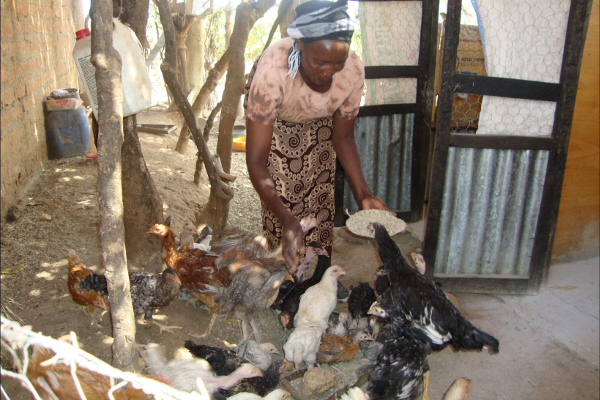
Helping Women Feed Their Families in Rural Kenya
 In rural Kenya, women have few resources to call their own. Despite this, they are primarily responsible for feeding their families and taking on the lion’s share of household and agricultural work. Employment and income generating opportunities for women are meager, particularly given the time constraints of heavy household demands. More than 30 percent of all Kenyan households are headed by women, and the majority of these households face chronic food insecurity.
In rural Kenya, women have few resources to call their own. Despite this, they are primarily responsible for feeding their families and taking on the lion’s share of household and agricultural work. Employment and income generating opportunities for women are meager, particularly given the time constraints of heavy household demands. More than 30 percent of all Kenyan households are headed by women, and the majority of these households face chronic food insecurity.
Winrock’s USAID-funded Partnership for Safe Poultry in Kenya (PSPK) program offers a viable solution for rural, food insecure families, providing women (as well as men) with opportunities to increase income and produce an important protein source for their families. As the primary poultry producers in Kenya, women comprise more than 65 percent of PSPK’s beneficiaries.
Before receiving support from PSPK, Alice Pius Makau, from Makueni District, struggled to feed her family. Household income and food sources — particularly protein sources — were extremely limited, and on some days there was not enough food to go around. Alice was already raising chickens, but was doing so ineffectively without information on how to keep her chickens healthy and free of disease.
PSPK provided Alice and other members of the Kyemole Poultry Keepers Group with training and technical assistance on biosecurity and safe poultry production, as well as linkages with buyers, improved feed and financing. As a result, Alice and her fellow poultry producers are now gaining confidence, earning extra money and improving their family’s nutrition. Alice proudly states, “I am not afraid of my children sleeping hungry anymore, because I have enough food for them, all of the time. The money I get from chicken sales helps me to buy the food that I do not grow on the farm. I also have a constant supply of meat and eggs for my family’s protein nutrition.”
Testimonials from other women tell similar stories of positive change and increased food security. Christine Kyalo, also from the Kyemole Poultry Keepers group in Makueni, proudly explains, “Before this project, my family ate meat only on special occasions. In the past, eggs were not common in the home, but now I give two eggs to each member of the family every day, and especially during the dry periods, eggs form part of the meals that I cook.”
Selesia Abolo, of the Star Ladies Women Poultry Group, asserts that the livelihoods of many women have been greatly enhanced — including her own. “My earning an income from [raising] chicken[s] has reduced tensions that were in the family because of lack of enough money,” she said. “Now we are able to manage through tough times, because there is at least money to buy something to eat.”
Likewise, Marieta Mackenzie from the South Mbooni District explains, “My life has changed. Now, I also have money just like my husband. The feeding habit of my family has changed. The family now diets on chicken when they wish, or anything else which I can afford.”
In 18 months, PSPK has trained more than 1,000 women, benefiting nearly 1,700 poor households.
PSPK links poultry sector stakeholders with experienced experts from the U.S. and East Africa, who donate their time to the project as Farmer-to-Farmer volunteers. These volunteers have provided 4,800 hours of technical assistance and training to improve the lives of poultry producers in Kenya.
